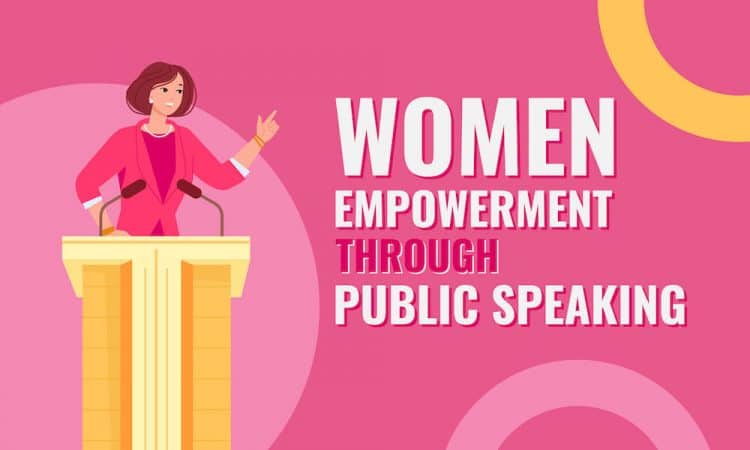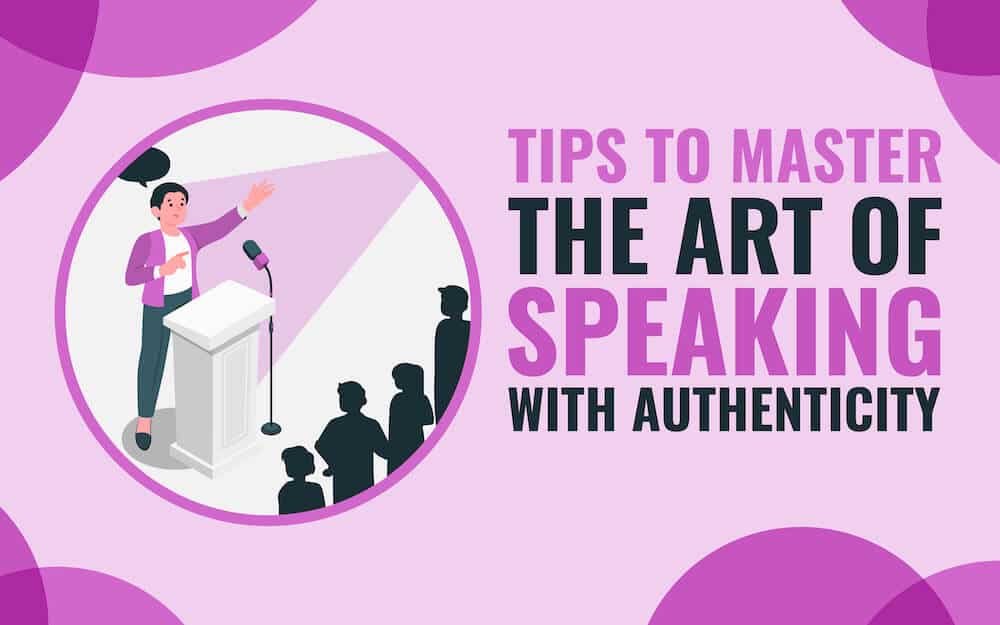
Which names come to your mind if we talk about female public speakers? Oprah Winfrey, Michelle Obama, Taylor Swift, and Malala Yousafzai, to name a few – right? With their unique style, these speakers have made their own distinct space and identity in the world of public speaking. By defying the odds, challenging stereotypes, smashing glass ceilings, and breaking down all barriers, they have become role models for aspiring women speakers.
While these women speakers are blazing a trail, some females still struggle to muster up the courage to stand up on the podium, hold the mic, and speak their minds. According to a source, about 44% of women have a fear of public speaking. Research reveals that in England, half of the 15-year-old girls lack the confidence to speak in public.
Women have the potential to make a difference in the world by amplifying their voices and putting their experiences and perspectives across with confidence. What they need is – a little support, an opportunity, the right platform, and the courage to speak up.
In this article, we have reflected on the importance of public speaking, its challenges for women, and ways to overcome these obstacles. Read on!
Female Public Speaking: The Historical Context
The journey of women in public speaking, which was once said to be the male-dominant field, has not been easy – it’s a story of determination and resilience amidst suppression, adversity, and marginalization.
In the early years, women’s voices were suppressed by societal expectations and patriarchal norms. As their roles were confined to domestic chores, they were excluded entirely from leadership positions and speaking engagements. Lack of education and pervasive prejudices and stereotypes further prohibited women from stepping into the sphere of public speaking. Those who dared to speak out faced extreme resistance and backlash.
The 1950s and 1960s were transformative for female speakers. Advocacy for social justice and racial equality empowered women’s voices. Gradually, the progress made in women’s education and gender equality empowered females to challenge societal norms and express their viewpoints and thoughts in public.
Today, women continue to champion public speaking and making a meaningful impact. With their power-packed voices, they are paving the way for future generations of female speakers.
Importance of Public Speaking for Women
1. Boost the Confidence
Speaking in public is not easier said than done. You need to work a lot to overcome your insecurities, self-doubts, and fears and showcase your authentic self, passion, and expertise. In the entire process of practicing and learning, you boost your confidence. Further, the audience’s support, feedback, and appreciation positively impact your confidence, encouraging you to enroll in more speaking opportunities.
2. Leadership Development
Public speaking opens new avenues for females and prepares them for leadership roles by enhancing their confidence and improving their communication and decision-making skills. It also empowers them to build credibility and personal brand, increase their visibility, advocate for change, and inspire others – all these qualities are essential to become an influential leader.
3. Networks and Connection
Public speaking opportunities provide you with a platform to widen your reach, engage in conversations with like-minded people, connect with industry experts, and maximize your exposure to potential partners or clients. This collaboration increases your professional network, which is essential for career and business growth.
4. Lead Generation
You can leverage public speaking engagements to attract new clients and nurture valuable business relationships with them. By providing meaningful insights into your offerings, you can build trust among your target prospects and turn them into loyal customers.
Public Speaking Challenges for Women
a). Imposter Syndrome
Most women are reluctant to speak in public due to imposter syndrome. Feelings of inadequacy and incompetency despite delivering many successful presentations compel them to think twice before taking up public speaking gigs. Rather than giving credit to their own efforts and skills, they attribute their success to external factors, timing, and luck. This tendency negatively impacts their confidence and performance on the stage.
b). Fear of Judgment
One factor that holds females back from public speaking is the fear of being judged. The scrutinizing looks, bored sighs, and rolled eyes of the audience make women speakers concerned and doubtful of their abilities, limiting their success. Criticism and negative feedback shift their focus to external validation instead of the value of their message.
c). Striving for Perfection
Women tend to achieve perfection in everything – be it their looks, household chores, or the role they have been assigned at the workplace. And when it comes to public speaking, they feel that their communication skills must also be perfect. In the process of attaining perfection, they overlook authenticity. Feeling a lack of 100% knowledge makes them nervous, and they end up over-preparing.
d). Societal Expectations
Women are supposed to be approachable and likable as speakers without losing their assertiveness and confidence. Most females face difficulty balancing likeability and assertiveness and reclaiming control of the conversation, which prevents them from achieving success in public speaking.
e). Lack of Visibility and Representation
Assuming that males are better in technical, political, and financial subjects, the hosts/organizers of most finance and tech-related events and conferences prefer to have male speakers onboard. This underrepresentation of females in workshops, seminars, panel discussions, and events strengthens the notion that public speaking is meant only for males, creating barriers for women speakers.
f). Stereotypes and Biases
Despite advancements in gender equality, some stereotypes and biases still prevail that hold women speakers back. Women are considered less capable, authoritative, and competent in public speaking than men. These stereotypes diminish women’s confidence, resulting in hesitation and self-distrust.
g). Disregard and Interruptions
According to research, women are interrupted 2.1 times more than men. The constant interruptions and experiences of being not heard get magnified gradually, shaking their confidence. As a result, they look out for all possible reasons to avoid public speaking opportunities and escape neglect.
Tips to Ace Public Speaking
1. Seek Mentorship from Experienced Speakers
Seeking help and support from experienced speakers will help you shape your public speaking skills rightly.
A mentor can help you by-
- offering feedback on the content, style, structure, and delivery of your speech.
- sharing tips and techniques to improve your eye contact, voice, gestures, and body language.
- exposing you to distinct speaking formats and situations.
- assisting you in overcoming your self-doubt and nervousness.
2. Practicing Public Speaking in Safe Spaces
As a beginner, you can overcome glossophobia and instill confidence by practicing in front of people with whom you are comfortable and at places that make you feel relaxed. It allows you to experiment with different styles, techniques, and delivery methods without worrying about being judged or criticized.
You can also take the help of apps, such as VirtualSpeech, that allow you to improve your presentation skills by providing useful insights into your volume, pace, use of filler words, time length, and other aspects.
3. Continuous Learning and Improvement
By investing in continuous learning, you can improve your public speaking skills and meet the evolving expectations of the audience. You can read books or enroll in courses that focus on a particular aspect of speaking, such as presentation design, humor, persuasion, or storytelling.
Also, work on feedback provided by coaches, mentors, colleagues, or friends during your practice session.
Seek opportunities to apply new learnings in real-life contexts.
4. Speak with Confidence and Authenticity
You can make your speech memorable for the audience not only with your power-packed words but also through the way you say them.
So, project authenticity in your speech and replace fear with confidence using the following tips-
- Balance aggression and modesty.
- Avoid filler words, such as ‘like,’ ‘umm,’ and ‘you know.’
- Use your gestures, facial expressions, and body language positively to demonstrate passion for your topic.
- Take pauses to draw the audience’s attention.
- Don’t memorize the speech verbatim.
- Be you, and don’t hesitate to express your vulnerability.
5. Balance Your Communication Approach
As a speaker, you must know that the right side of the human brain is influenced by stories, while the left side of the brain can be won through facts. If you genuinely want to make an impact through your speech, you must use a balanced communication approach to captivate both sides of the brain.
For example, if you want to showcase any claim or research data, you must weave a story around it and support it with relevant evidence or logic.
6. Focus on the Audience Engagement
The first 30 seconds of your speech are extremely important for engaging your audience and keeping them intrigued until the end of your session.
Below are a few hacks to boost audience engagement-
- Start your speech strongly. You can use a surprising fact, relevant quote, controversial statement, or an eye-pleasing visual to grab the audience’s attention.
- Use captivating charts, graphs, infographics, and images to present complex and abstract data or concepts.
- Use humor, narrate a story, include an anecdote, or tell real-life examples to add a personal touch to your speech.
- Encourage audience involvement by making your speech interactive and conversational.
The Role of Event Organizers in Empowering Female Speakers
Event organizers play an important role in driving inclusivity, equitability, and diversity in the realm of public speaking. Instead of focusing on the gender of the speaker, organizers must make efforts to lineup subject matter experts who can bring immense value to the session and create a well-rounded experience for attendees with their out-of-the-box perspectives.
One reason that prevents women speakers from applying for speaking engagements is – a lineup of all-male speakers. Thus, to reduce the disparity of representation on stage and encourage more females to participate as speakers, organizers must ensure that they also include female speakers in the lineup.
Event organizers must provide women speakers with the needed guidance, facilities, equipment, and resources to uplift and empower them. They should organize mentorship programs to help them improve and enhance their speaking skills. Also, they should create networking opportunities for novel female speakers to connect them with experienced and seasoned speakers and get some success tips.
Celebrate and promote your speakers and make them feel valued by highlighting their experiences and achievements through social media, press releases, newsletters, and websites.
What Does the Future Look Like for Female Speakers?
According to the projections of the marketdata analysts, growing at a 4.1% average annual pace, the professional speaking industry’s value will reach $2.30 billion by 2025. (source)
This statistic indicates a promising and bright future for speakers.
The societal shifts towards increasing representation and visibility of females in all spheres, advancements of digital platforms and technology, and inclusive speaking engagements – all these factors will open new avenues for women speakers.
With their power-packed voices, authenticity, and unique style, female speakers will continue redefining leadership, catalyzing change and inspiring transformation in every aspect, and motivating the next generation of women to embark on the journey of public speaking.
The Bottom Line
Women’s voices hold great significance in all domains, including business, media, education, and politics. However, many factors and notions limit their opportunities, suppress their voices, and obstruct their effectiveness and credibility as speakers.
Women can overcome these challenges by standing up for themselves, embracing and sharing their unique thoughts and perspectives, and building an inclusive world where future female speakers can thrive. Having said that, the collective role of society, business organizations, and event organizers in creating a supportive environment for female speakers can’t be overlooked.



